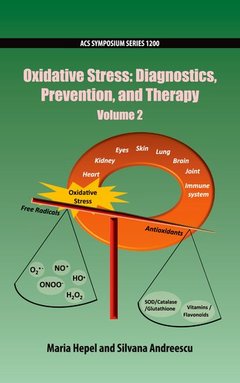Description
Oxidative Stress
Diagnostics, Prevention, and Therapy Volume 2
ACS Symposium Series
Coordinators: Hepel Maria, Andreescu Silvana
Language: English
Subject for Oxidative Stress:
Publication date: 09-2016
560 p. · 16.2x23.3 cm · Hardback
560 p. · 16.2x23.3 cm · Hardback
Description
/li>Biography
/li>
This book provides a comprehensive overview of the oxidative stress related mechanisms in biological systems and the involvement of reactive oxygen and nitrogen species (ROS and RNS), the damage of DNA, proteins, and lipids caused by oxidative stress, the protection of cells and tissues against free radicals, the relation of the oxidative stress to aging and human diseases including cancer and neurological disorders, and the development of new therapeutic approaches to modulate oxidative stress. The current state-of-the-art methodologies including the development of sensors and biosensors for the detection of ROS/RNS and of biomarkers of oxidative stress are also discussed. The book is organized in three overlapping parts, starting with general considerations of the oxidative stress, homeostasis pathways, and ROS mechanisms, followed by chapters discussing the involvement of ROS in particular diseases and concluding with analytical aspects of oxidative stress monitoring. The book provides a solid background on oxidative stress and ROS/RNS generation for novice learners while also offering scientists and practitioners already involved in this field a wealth of information covering the most recent developments in the study of oxidative stress, the role of radical species, novel antioxidant therapies, and methods for assessing free radicals and oxidative stress.
Maria Hepel received her M.S. and Ph.D. in chemistry from Jagellonian University in Krakow, Poland. Beginning in 1985, she worked as part of the faculty at the State University of New York at Potsdam where she is now a professor and Chair of the Department of Chemistry. She has published more than 160 papers and 44 chapters in books, and she has made more than 400 presentations at national and international symposia. Her current research interests are multidisciplinary and include DNA intercalation sensors, piezoimmunosensors, sensors for biomarkers of oxidative stress and cancer, fluorescence energy transfer (FRET and NSET), DNA-hybridization biosensors, microsensor arrays, controlled drug release systems, nanotechnology, dye pollutant degradation, supercapacitors and electrochromic devices. Silvana Andreescu is the Egon Matijevi? Endowed Chair in Chemistry in the Department of Chemistry and Biomolecular Science at Clarkson University. Her research interests include biosensors, bioanalytical applications of metal and metal oxide nanoparticles, and the development of microelectrochemical probes for studying physiological mechanisms in biological systems.
© 2024 LAVOISIER S.A.S.

